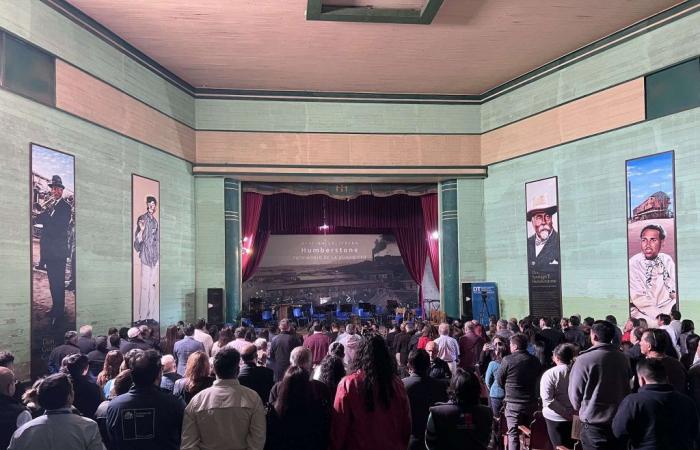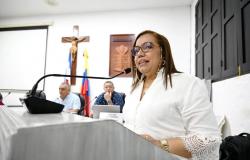
• National director Pablo Zenteno led the ceremony to a full house in the former Humberstone nitrate office.
The Labor Directorate (DT) commemorated its centenary this Wednesday at the former Humberstone nitrate office, remembering that it was in Tarapacá where the labor union movement emerged in the midst of the rise of the nitrate industry at the beginning of the last century.
The supervisory body was created on September 29, 1924, in the midst of strong social tensions in the country. Precisely, one of its first functions of the institution was to generate improvements in working conditions and the situation of workers, through the supervision of compliance with labor laws.
The commemorative cycle of the century of life of the DT considers the realization of the so-called “centennial milestones” in all regions of the country, activities that have been endowed with a historical perspective that symbolizes its mission of ensuring compliance with labor laws, pensions and safety and health at work.
This commemoration has had the same tenor in Tarapacá. In this case, its purpose was to seek a regionalist and integrative view that considered the historical events that have marked the region.
In this regard, the national director of Labor, Pablo Zenteno, expressed that “it has been a very emotional, symbolic, historical milestone, loaded with a lot of political and social connotation, showing how our institution is undoubtedly marked and conditioned by what which were the union struggles at the beginning of the twentieth century, and especially in this pampas and nitrate region at the time.”
The commemorative cycle will culminate at the beginning of October with the celebration between the 2nd and 4th in Santiago of the Third Meeting of the Ibero-American Network of Labor Inspections (Redibit), an organization created to facilitate the exchange of information and knowledge that improves the inspection of labor laws in all member countries.
Along with this, the so-called Centenary Commission, made up of, among others, five former directors of Labor, will deliver an analysis document on the Labor Directorate of the future.
Activities
The first commemorative activity, headed by the deputy national director Laura Vásquez and the regional director Jaime Rojas, took place yesterday Tuesday in front of the Provincial Labor Inspection and consisted of a “Pawa” ceremony, an Aymara ritual to request permission and blessing to the Pachamama before carrying out any type of activity and that coincided with the eve of “Machaq Mara”, the New Year of this ethnic group.
This Wednesday the commemoration moved to Humberstone, and was led in the theater of the former nitrate office by director Pablo Zenteno, who was accompanied by authorities such as the Seremi of Labor and Social Welfare, Ignacio Prieto; the regional presidential delegate of Tarapacá, Daniel Quinteros; the provincial presidential delegate of Tamarugal, Camila Castillo and the regional president of the CUT, Esmeralda Contreras.
At the beginning, the activity included a greeting through a video from the Minister of Labor and Social Security, Jeannette Jara.
The focus of the activity in a packed theater was the exhibition of the 2014 National History Prize winner, Iquique historian and sociologist Sergio González. His story “General overview of worker demand in the context of the saltpeter cycle (1890-1919)” recalled the harsh living and working conditions that generated social and labor demands repressed by the Chilean state and that in Tarapacá unleashed worker massacres such as those of the Santa María School of Iquique, in December 1907, and of La Coruña, in June 1925.
The commemoration of the DT continued with the dance presentation of the Violeta Parra Artistic School of Iquique “Carnival time… let’s meet again with our traditions”, and of the Liceo Bicentenario School Symphony Orchestra “Williams Taylor”.
Recognitions and tributes
During the event, recognitions were presented to three prominent and former officials of the Regional Labor Directorate. They are Valeria Prado and Hilda Calderón, both joined the institution in 1975, and Horacio Ara, former regional director, joined in 1981.
Then a posthumous tribute was paid to Hugo Bolívar, teacher leader, social fighter and former councilor for Iquique, and to the leaders Guadalupe Salas, president of the Union and the Federation of Food Handlers of Chile, and Esmeralda Contreras, former national leader of the workers of the Integra Foundation and current president of the CUT Tarapacá.
The event was closed with words from the regional director of Labor, Jaime Rojas.
Subsequently, in Humberstone, the Labor Directorate and the Arturo Prat University signed a collaboration agreement to disseminate and train workers, students and users of the DT in Tarapacá in labor, pension and hygiene and safety legislation, and promote social dialogue through working groups, mediations and contests that fulfill that purpose.





